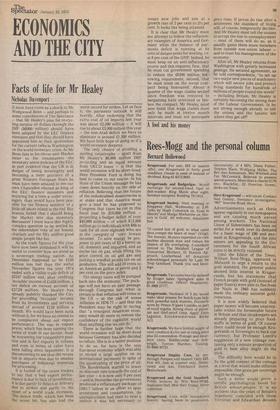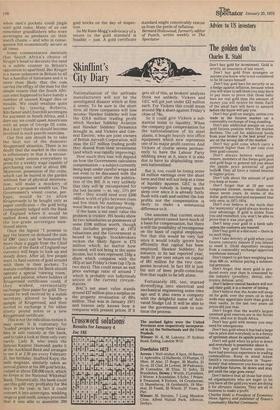A fool and his money
Rees-Mogg and the personal column
Bernard Hollowocid
Krugerrand. For sale, £85 or nearest offer, one Krugerrand in fairly good condition. Owner in need of interest or dividend. Ring 01-8372 9845.
Krugerrands and Budgerigar. Would exchange for second-hand Opel or dish-washer. Ring Mavis after eight. Sundays excepted. Reading 7911012.
Krugerrand Society. Next meeting at Kingsway Hall, Wednesday at 2.30. Talks by Hugh Comstock on 'Gold in History' and Madge Markarme on 'History in Gold'. All welcome. Admission free.
"0 cursed lust of gold, to what canst thou compel the heart of man" (Virgil, The Aeneid). Moneys expended on vain baubles diminish man and reduce his chance of life everlasting. Contribute instead to The Melshett League of Unmarried Mothers, 51 Station Approach, Leatherhead. All donations acknowledged personally by Lady De Trop Gotthard. Thank you and blessings.
Krugerrands. Two coins heavily defaced by Kruger hater. Springbok sides in good condition. Offers? Heatherley, 01-3069 27777.
Krugerrands. Necklace of 5 Ks would make ideal present for butch-type lady with powerful neck muscles. Formerly worn by Prince N'ganii Lualaba as part of royal regalia. Strong chain of platinum and thief-proof clasp. Apply Zaire Legation, Knockwurststrasse, Berlin A13.
Krugerrands. We have limited supply of mint condition Ks for sale at ruling price plus £3 commisgion. Postage and insurance extra. Biddlecombe and Arkwright, Tontine Marshes, Tooting. 01-9949 30725.
Krugerrand Display Case, In seethrough Perspex and enamel. Only £25. Few left. Sale at counter only. Drummond and Axe, Fenchurch Street, Bexleyheath.
Krugerrand and the Gold Standard. Public lectures by Wm Rees-Mogg, Stationers Hall, Mon thro' Friday. Silver collection.
Krugerrand. Coin with remarkable history, having been in possession, successively, of 4 MPs, Diana Poitier, Stephen Black, Wolfgang Muller, The Rev Alec Kennersley, Mrs Whitlam and Fay McCormick. Believed to possess special powers. More than a charm! £176 ono. Blackfist, 22 Overton Street, Stoke-on-Trent.
Have Krugerrand — will travel. Contact Ned Oakley, freelance investigator, "007" Seaview Road, Hove.
Advertisements such as these appear regularly in our newspapers and are causing much unrest among workers. The National. Union of Sidewinders has been on: strike for a week over its demand, for a basic wage of £90 and payment in Krugerrands, and the zinc; miners are appealing to the Go-' vernment for the South African coins to be strictly rationed.
Until the Editor of the Times, William Rees-Mogg, appeared in Midweek to urge a return to the gold standard, the general public showed little interest in Krugerrands, but his statement that French people with gold (instead of paper francs) were able to flee from the Nazis in 1940 has suddenly made the ordinary unionist goldconscious.
It is now widely believed that paper money will become unacceptable within the foreseeable future in Britain and that shopkeepers are already preparing to price foodstuffs in terms of gold. Of course there could never be enough Krugerrands or Sovereigns to back our currency, but Professor Lentil's suggestion of a new coinage containing only a minute proportion of gold to base alloy might do the trick.
The difficulty here would be to fix the gold content of the coinage at a level that would make inflation impossible. One grain per sovereign might be enough.
Such a move would prove a terrific psychological boost for British amour-propre. It is no accident that the years of Britain's hegemony coincided with those Victorian and Edwardian decades when men's pockets could jingle with gold coins. Many of us can remember grandfathers who wore sovereigns as pendants on their watch chains — and who in consequence felt economically secure at all times.
Some commentators maintain that South Africa's choice of Kruger's head to decorate the rand is a subtle counter to Britain's opposition to apartheid. But Kruger is a name unknown in Britain to all but a handful of historians and it is more than likely that the coin carries the effigy of the man for the simple reason that the South African mint happened to have handy a number of unused Kruger dies or moulds. We could retaliate quite easily by issuing Roberts, Kitchener and Churchill sovereigns for payment in South Africa, and I dare say we could upset Americans with an issue of George III coins. But I don't think we should become involved in such puerile exercises. Our first aim should be to take the heat out of the domestic Krugerrand situation. There is no doubt that the market in the coins is inflationary in that it is encouraging trade unions everywhere to press for a weekly wage capable of purchasing one rand at about £90. Moreover, possession of the coins, which can be buried in the garden without fear of physical deterioration, will make a mockery of Labour's proposed wealth tax. The Government's wisest course, perhaps, would be to allow Krugerrands to be bought only as paper certificates — the gold being compulsorily lodged with the Bank of England where it would be melted down and converted into the low-grade sovereigns mentioned above.
Once the legend "I promise to pay the bearer on demand the sum of £90" (say) can be honoured by more than a giggle from the Chief Cashier of the Bank of England our currency will begin to look up and steady down. After all, few people want to haul ounces of gold around with them in their pockets. To sustain confidence the Bank should operate a special 'viewing room,' posh and palatial, where holders of Krugerrand certificates could, if they wished, ceremonially exchange their paper for gold. They would be well received by a nubile secretary, allowed to handle a sample of Krugerrand, and then invited to exchange it for either ninety pound notes or a new Krugerrand certificate.
This is not the ridiculous notion it may seem. It is customary for 'loaded' people to keep their valua-• bles in safe custody at the bank, and to take a look at them only very rarely. Lady B, who owns the famous Kasimir Diamond, parks it at the Auckland Bank and arranges to see it at 2.30 pm every February 21, her birthday. Stafford Kaye, the milk magnate, similarly takes an annual glance at his 200 gold bricks, valued at about £30,000 each, which he keeps at the National Whitehall Bank. Theoretically, the bank could use this gold very profitably for 364 days in the year: in fact it could convert it into sovereigns, wedding rings or gold teeth, always provided that it was able to assemble 200 gold bricks on the day of inspection.
So Mr Rees-Mogg's advocacy of a return to the gold standard is feasible — just. A gold certificate
standard might conceivably rescue us from the perils of inflation. Bernard Hollowood, formerly editor of Punch, writes weekly in The Spectator



























 Previous page
Previous page